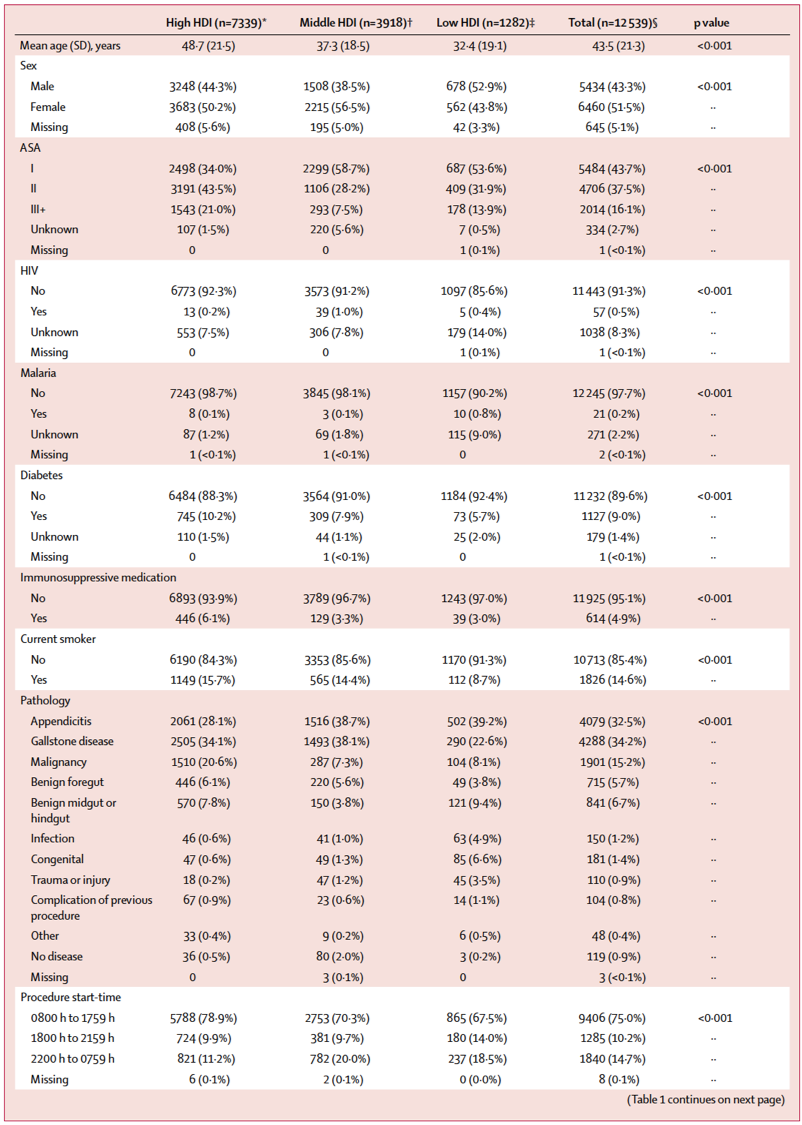Surgical site infection after gastrointestinal surgery in high-income, middle-income, and low-income countries: a prospective, international, multicentre cohort study
GlobalSurg Collaborative
Lancet Published: 13 February 2018
DOI: https://doi.org/10.1016/S1473-3099(18)30101-4
Summary
Background 背景
Surgical site infection (SSI) is one of the most common infections associated with health care, but its importance as a global health priority is not fully understood. We quantified the burden of SSI after gastrointestinal surgery in countries in all parts of the world.
手术部位感染(SSI)是医疗最常见的感染之一,但作为全球健康问题的重要性仍不完全清楚。我们对世界各地国家胃肠道手术后SSI造成的疾病负担进行了定量研究。
Methods 方法
This international, prospective, multicentre cohort study included consecutive patients undergoing elective or emergency gastrointestinal resection within 2-week time periods at any health-care facility in any country. Countries with participating centres were stratified into high-income, middle-income, and low-income groups according to the UN's Human Development Index (HDI). Data variables from the GlobalSurg 1 study and other studies that have been found to affect the likelihood of SSI were entered into risk adjustment models. The primary outcome measure was the 30-day SSI incidence (defined by US Centers for Disease Control and Prevention criteria for superficial and deep incisional SSI). Relationships with explanatory variables were examined using Bayesian multilevel logistic regression models. This trial is registered with ClinicalTrials.gov, number NCT02662231.
这是一项国际、前瞻、多中心队列研究,在为期2周的研究期限内,入选任何国家任何医疗卫生机构中连续收治的择期或急诊胃肠道手术患者。根据联合国人类发展指数(HDI)将参研中心所在国家分为高收入、中收入和低收入组。将GlobalSurg 1研究及影响SSI风险的其他研究中的数据参数加入风险校正模型。主要预后指标为30天SSI发生率(根据美国CDC有关浅表和深部切口SSI的定义)。采用Bayesian多水平logistic回归模型对可能的参数指标进行检验。研究在 ClinicalTrials.gov注册,注册号NCT02662231。
Findings 结果
Between Jan 4, 2016, and July 31, 2016, 13 265 records were submitted for analysis. 12 539 patients from 343 hospitals in 66 countries were included. 7339 (58·5%) patient were from high-HDI countries (193 hospitals in 30 countries), 3918 (31·2%) patients were from middle-HDI countries (82 hospitals in 18 countries), and 1282 (10·2%) patients were from low-HDI countries (68 hospitals in 18 countries). In total, 1538 (12·3%) patients had SSI within 30 days of surgery. The incidence of SSI varied between countries with high (691 [9·4%] of 7339 patients), middle (549 [14·0%] of 3918 patients), and low (298 [23·2%] of 1282) HDI (p<0·001). The highest SSI incidence in each HDI group was after dirty surgery (102 [17·8%] of 574 patients in high-HDI countries; 74 [31·4%] of 236 patients in middle-HDI countries; 72 [39·8%] of 181 patients in low-HDI countries). Following risk factor adjustment, patients in low-HDI countries were at greatest risk of SSI (adjusted odds ratio 1·60, 95% credible interval 1·05–2·37; p=0·030). 132 (21·6%) of 610 patients with an SSI and a microbiology culture result had an infection that was resistant to the prophylactic antibiotic used. Resistant infections were detected in 49 (16·6%) of 295 patients in high-HDI countries, in 37 (19·8%) of 187 patients in middle-HDI countries, and in 46 (35·9%) of 128 patients in low-HDI countries (p<0·001).
2016年1月4日至7月31日之间,共有13265条记录提交分析。最终纳入66个国家343家医院的12539名患者。7339名(58·5%) 患者来自高HDI国家(30个国家193家医院),3918名 (31·2%) 患者来自中等HDI国家(18个国家82家医院),1282名 (10·2%) 患者来自低HDI国家(18个国家68家医院)。手术后30天内共有1538名 (12·3%) 患者发生 SSI。高HDI国家(691/7339 [9·4%])、中等HDI国家(549/3918 [14·0%])及低HDI国家(298/1282 [23·2%])之间SSI发生率差异很大(p<0·001)。对于每个HDI组而言,感染手术后SSI发生率最高(高HDI国家102/574 [17·8%];中等HDI国家74/236 [31·4%];低HDI国家72/181 [39·8%])。在对危险因素进行校正后,低HDI国家患者SSI风险最高(校正后比数比1·60, 95%可靠区间 1·05–2·37; p=0·030)。610名有微生物学培养结果的SSI患者中,132名 (21·6%) 致病菌对预防性抗生素耐药。高HDI国家的295名患者中,49名 (16·6%) 发生耐药菌感染,中等HDI国家的187名患者和低HDI国家的128名患者中,分别有37名 (19·8%)和 46名 (35·9%) 发生耐药菌感染。
Interpretation 结论
Countries with a low HDI carry a disproportionately greater burden of SSI than countries with a middle or high HDI and might have higher rates of antibiotic resistance. In view of WHO recommendations on SSI prevention that highlight the absence of high-quality interventional research, urgent, pragmatic, randomised trials based in LMICs are needed to assess measures aiming to reduce this preventable complication.
与中高HDI国家相比,低HDI国家SSI的疾病负担异常高,且抗生素耐药比例较高。鉴于WHO有关SSI预防的推荐意见强调缺乏高质量干预研究,需要在LMICs进行紧急的实效性随机试验,以评价旨在减少这种可以预防的并发症的措施。
Funding
DFID-MRC-Wellcome Trust Joint Global Health Trial Development Grant, National Institute of Health Research Global Health Research Unit Grant.





